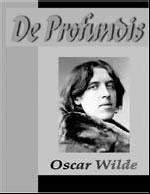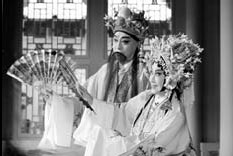Reviews
Book
De Profundis (Zi Shengsheng Chu)

Published by Yilin Press
This Oscar Wilde work comes in the best possible format I can imagine: It includes both the English original and a fluent Chinese translation; besides the print version, it is an audio book, again, both in Chinese and English, recorded by voice actors with sensitivity towards the material. The audio versions are only excerpts, though. But it's a good start. I wish all literary classics can be published this way, so that the inner voice of reading could manifest itself through a disk player or MP3.
The book is a long letter the jail-confined Oscar Wilde wrote to his lover. It is full of reflections on subjects like love, art and, of course, his fate. It is amazing to see this genius of wit traversing from love-forlorn tenderness to bitterness and then rising to the cathartic realm of regained peace through art.
There is a slight difference in the tones of the two readers: The Chinese version has more sadness, as if the author has difficulty to let go of his past; and the English one finds him in more peace of mind.
Opera
Palace of Eternal Youth (Changsheng Dian)

Performed by the Shanghai Kunqu Opera Troupe
The complete version of this rarely performed classic ran in Beijing's Poly Theater on four consecutive nights, from April 30 through May 3, making it comparable to Wagner's Ring cycle, but more of a stylistic and thematic parallel with Monteverdi's Coronation of the Poppea.
A decade ago, the same troupe was prevented from attending a full-length staging of The Peony Pavilion, a better known Kunqu classic, at New York's Lincoln Center.
Palace of Eternal Youth tells of the love story between Tang Dynasty (AD 618-907) emperor Li Longji and his concubine Yang Yuhuan, which is immortalized in many poetic and operatic dramatizations. The current production features a talented cast with exquisite singing and stylized yet expressive performances.
The staging incorporates a dozen Venetian blind-like panels that add to the abstract look, thus enriching the original effect of Chinese opera stylization. A few of the highlighted musicians are placed on both sides of the proscenium - a reminder of Kabuki, and the narrator at the beginning and end of each night coincides with the structure of Romeo and Juliet.
The English translation of the lyrics, by the great Yang Xianyi and Gladys Yang, captures the beauty of the Ming Dynasty script.
Drama
The Blind
Directed by Lin Zhaohua
This Maurice Maeterlinck play has been given an ingenious interpretation almost a century after it was written. Lin Zhaohua, China's preeminent stage director, has again presented a classic with relevance to today's China. This time, his genius touch is to cast 12 real blind actors.
The Nine Theater in Chaoyang Culture Center is sparsely decorated. A bare floor is strewn with rocks that symbolize a forest. Two side lights and a few sound effects strategically create the right atmosphere for all the occasions. What is truly amazing are the actors, all non-professionals, whose delivery of lines and very presence convey a strong sense of poignancy.
The play leaves many questions unanswered: What was the relationship between the blind people and the priest? Was he their savior or a demagogue?
The group dynamics are quite typical of the herd mentality and the human need for hope and conformity.
The play will have its second run from May 11-18. English titles are projected on a wall.
Raymond Zhou
(China Daily 05/08/2008 page20)














